Patients at risk for utis - Study guides, Class notes & Summaries
Looking for the best study guides, study notes and summaries about Patients at risk for utis? On this page you'll find 1057 study documents about Patients at risk for utis.
Page 3 out of 1.057 results
Sort by
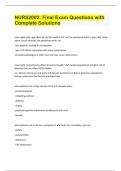
-
NURS2002: Final Exam Questions with Complete Solutions
- Exam (elaborations) • 17 pages • 2024
-
- $13.48
- + learn more
how might older age affect GI and GU health? -risk for nutritional deficits: poor diet, living alone, social isolation, not preparing meals, etc -dec appetite, leading to constipation -lots of GI effects associated with many medications -prostate pathologies in older men that may cause obstructions how might race/ethnicity affect GI and GU health? -certain populations at higher risk of diseases that can affect GI/GU health -ex: African Americans and sickle cell disease, alcoholism in Nati...
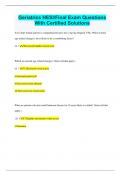
-
Geriatrics HESI/Final Exam Questions With Certified Solutions
- Exam (elaborations) • 29 pages • 2024
- Available in package deal
-
- $9.99
- + learn more
Geriatrics HESI/Final Exam Questions With Certified Solutions Your older female patient is complaining because she is having frequent UTIs. Which normal age-related change is most likely to be a contributing factor? ch. 3 Decreased bladder muscle tone Which are normal age-related changes? (Select all that apply.) ch. 3 1 Decreased visual acuity 4 Increased gastric pH 8 Decreased serum albumin 10 Decreased rate of peristalsis What are patients who have had Parkinson disease for ...
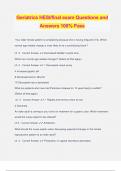
-
Geriatrics HESI/final exam Questions and Answers 100% Pass
- Exam (elaborations) • 21 pages • 2024
-
- $12.49
- + learn more
Geriatrics HESI/final exam Questions and Answers 100% Pass Your older female patient is complaining because she is having frequent UTIs. Which normal age-related change is most likely to be a contributing factor? ch. 3 - Correct Answer ️️ -Decreased bladder muscle tone Which are normal age-related changes? (Select all that apply.) ch. 3 - Correct Answer ️️ -1 Decreased visual acuity 4 Increased gastric pH 8 Decreased serum albumin 10 Decreased rate of peristalsis What are patie...
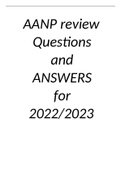
-
AANP review Questions and ANSWERS for 2022/2023
- Exam (elaborations) • 51 pages • 2023
- Available in package deal
-
- $14.49
- 1x sold
- + learn more
AANP review Questions and ANSWERS for 2022/2023 Classic ECG finding in atrial flutter. Correct Answer: "Sawtooth" P waves Definition of unstable angina. Correct Answer: Angina is new, is worsening, or occurs at rest Antihypertensive for a diabetic patient with proteinuria. Correct Answer: ACEI Beck's triad for cardiac tamponade. Correct Answer: Hypotension, distant heart sounds, and JVD Drugs that slow AV node transmission. Correct Answer: β-blockers, digoxin, calcium cha...
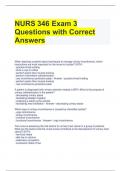
-
NURS 346 Exam 3 Questions with Correct Answers
- Exam (elaborations) • 21 pages • 2023
- Available in package deal
-
- $13.49
- + learn more
NURS 346 Exam 3 Questions with Correct Answers When teaching a patient about techniques to manage urinary incontinence, which instructions are most important for the nurse to include? SATA: - practice timed voiding - drink a cup of coffee - perform pelvic floor muscle training - perform intermittent catheterization - use incontinence protective pads - Answer-- practice timed voiding - perform pelvic floor muscle training - use incontinence protective pads A patient is diagnosed wit...
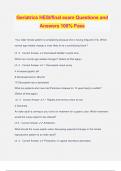
-
Geriatrics HESI/final exam Questions and Answers 100% Pass
- Exam (elaborations) • 21 pages • 2024
-
- $12.49
- + learn more
Geriatrics HESI/final exam Questions and Answers 100% Pass Your older female patient is complaining because she is having frequent UTIs. Which normal age-related change is most likely to be a contributing factor? ch. 3 - Correct Answer ️️ -Decreased bladder muscle tone Which are normal age-related changes? (Select all that apply.) ch. 3 - Correct Answer ️️ -1 Decreased visual acuity 4 Increased gastric pH 8 Decreased serum albumin 10 Decreased rate of peristalsis What are patie...
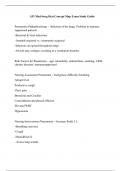
-
ATI Med-Surg Hesi Concept Map Exam Study Guide
- Exam (elaborations) • 41 pages • 2023
-
- $12.00
- + learn more
Pneumonia Pathophysiology - -Infection of the lungs. Problem in immunesuppressed patients. -Bacterial & Viral infections - hospital-acquired vs. community-acquired -Infection can spread throughout lungs. -Alveoli may collapse, resulting in a ventilation disorder. Risk Factors for Pneumonia - -age, immobility, malnutrition, smoking, URTI, chronic diseases, immunosuppressed Nursing Assessment Pneumonia - Tachypnea/ difficulty breathing Abrupt fever Productive cough Chest pain Bronchial ...
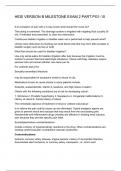
-
hesi version b milestone exam 2 part pg1-10
- Exam (elaborations) • 9 pages • 2024
-
- $12.49
- + learn more
If pt complains of pain with a 3-way lumen what should the nurse do? The tubing is examined. The drainage system is irrigated with irrigating fluid (usually 50 ml), if indicated and prescribed, to clear any obstruction. Continuous bladder irrigation or bladder wash out is performed to help prevent what? Urinary tract obstruction by flushing out small blood clots that may form after prostate or bladder surgery such as turp or turbt What fluid should be used for bladder irrigation? Use only s...
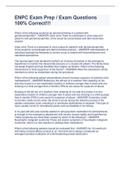
-
ENPC Exam Prep / Exam Questions 100% Correct!!!
- Exam (elaborations) • 7 pages • 2023
-
- $11.99
- 1x sold
- + learn more
A 5-year-old patient presents to the emergency department with severe dehydration due to viral gastroenteritis. He has signs of shock due to his hypovolemia. Which of the following physiologic responses to shock has the greatest impact on improving cardiac output in the pediatric patient? - ANSWER Increasing heart rate In pediatric patients, tachycardia is the primary compensatory mechanism to increase cardiac output. A toddler has a chemical eye injury. Which of the following is the priority...
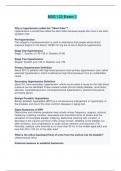
-
NSG 123 Exam 3 - Questions and Answers
- Exam (elaborations) • 19 pages • 2024
- Available in package deal
-
- $18.49
- + learn more
NSG 123 Exam 3 - Questions and Answers Why is hypertension called the "Silent Killer"? Hypertension is sometimes called the silent killer because people who have it are often symptom free Pre-hypertension The category of prehypertension is used to emphasize that people whose blood pressure begins to rise above 120/80 mm Hg are at risk to become hypertensive Stage One Hypertension Stage 1: Systolic of 140-159 or Diastolic 90-99 Stage Two Hypertension Stage2: Systolic over 160 or Diastolic...

That summary you just bought made someone very happy. Also get paid weekly? Sell your study resources on Stuvia! Discover all about earning on Stuvia


